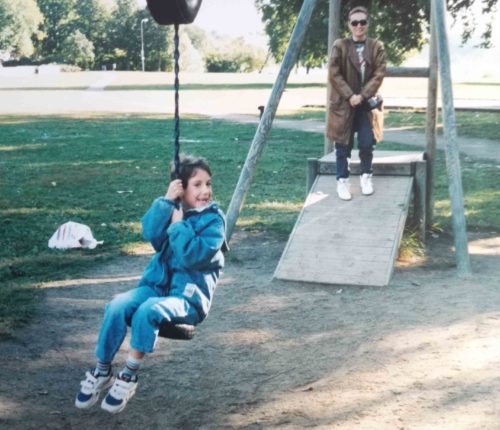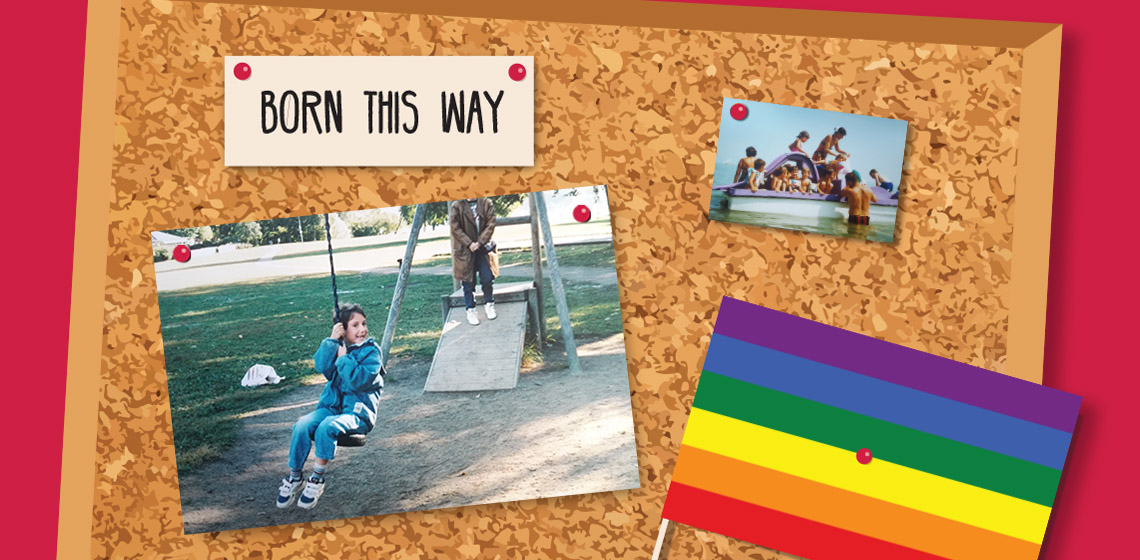The next piece of our Born this way series is by Daniella. Read the others' stories as well and find the series summary HERE.
Our page concept was inspired in LGBTQ+ solidarity by BornThisWayBlog.com
Daniella (6), 1995

On this picture (captured by my father with amazing skill, in spite of my breakneck speed), I’m around six years old, and my mother has just pushed me off of this awesome swing (or whatever it is). I really-really liked this swing. Let me also note what cool kicks I have! I’d totally wear those even today.
As you can tell from the photo, my parents managed to get me and my twin sister rather cool clothes, in spite of the shortage of diversity in fashion in the early 90s (and imagine the added difficulty for not one, but two little kids!). It’s also remarkable that my parents clothed me in a fairly gender neutral fashion (and how cool my mom is, too!)--and even my hair is short!
I had a lucky and a happy childhood: I liked being a kid, because I could be the person that I wanted to be. I was free to play soccer, run around, and I aptly fell into every puddle or other dirt that came my way. I was never told that these things were not appropriate for girls; I never got dolls or pink clothes as gifts, and I was rarely ever made to wear skirts--only for fancy occasions.
Despite all this, teenage proved to be a challenge: I had always been allowed to be who I wanted to be, so I didn’t understand why society expected me to change all of sudden. Why was every girl around me experimenting with make-up, tight-fitting clothes--and with boys? None of this interested me. I was especially exasperated with my beloved books: until now, I had always felt that these books were about human beings, and so about me. But now it became clear that I had been wrong: literature was only about men, men and boys. Harry Potter wasn’t about me. The Catcher in the Rye wasn’t about me. Even To Kill a Mockingbird wasn’t about me. The Hungarian children’s classic, The Pál Street Boys, wasn’t about me either, of course, even though I had been born right there, one street over, even though I had run around and played soccer in the empty lots that that book describes so affectionately. As central as the book is to the experience of every Hungarian growing up, I realized that I was excluded from that experience. I just couldn’t understand: why should I become a girl all of a sudden, when I had always just been a person?
I tried to change, I did: I tried to conform to expectations, I tried to renounce my humanity and become the “second sex” that Simone de Beauvoir speaks of. (At 14, I felt Beauvoir to be speaking for me entirely). I tried to understand that history was not my history (although it had been so far), the movies were not my movies, the world was not my world. I tried for a long time, but I could not succeed, and ultimately, I discovered that the fault was not with me. It wasn’t me who had to change: it was the world. My failure had not been a failure, but a splendid triumph: I did not belong to “the second sex,” and I could not and would not live this way.
And then there were girls, of course.
I could just describe this whole thing by saying simply: I’m a lesbian. I am not heterosexual. But this doesn’t exactly cover the truth. I’m not interested in men, it’s true. I love women, that’s true too. This made it incredibly liberating to say that I’m opting out of this whole heterosexual system: no, I’m not hetero. But for me, it was not enough to simply love women. I require a vision of society where we are all simply human and history, literature and culture belong to everyone. Therefore I could not just “change sides” and hedge my identity on that of the oppressor; it would have been a mistake to try and lay a claim on men’s literature in that way. My gayness also means that I reject that system in its entirety.
My parents and friends, and of course my sister, were very understanding when I came out. In fact, my sis knew what was up before I did. I could say that in one way, they were all more understanding towards me than I had been: had I been able to be more honest with myself than I had been, I could have known a long, long time ago that I was gay. But this possibility had somehow never really existed. Or so I thought. I mean, I would have had to reject an entire system of power and culture--a feat that I don’t think many people are capable of, especially not when they’re kids.One of my favorite writers, Virginia Woolf (I know, not a too original choice for a lesbian) once remarked in a novel that all women go through childhood as boys. Society wanted to change me, to mold me into its own vision of femininity, but it failed. Today I live as the person that I am, like the kid you see in the photo. So if anything from my experience sounds familiar to you, then I hope my story can address you directly: discard categories altogether, don’t ask who or what you are, simply accept the person that is you--no matter the designation!

